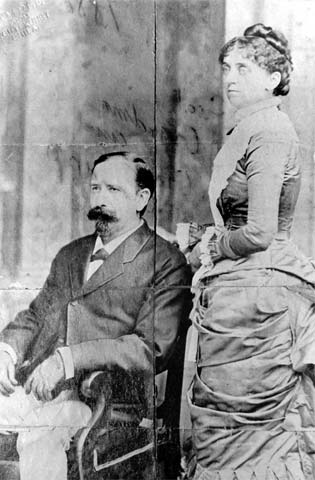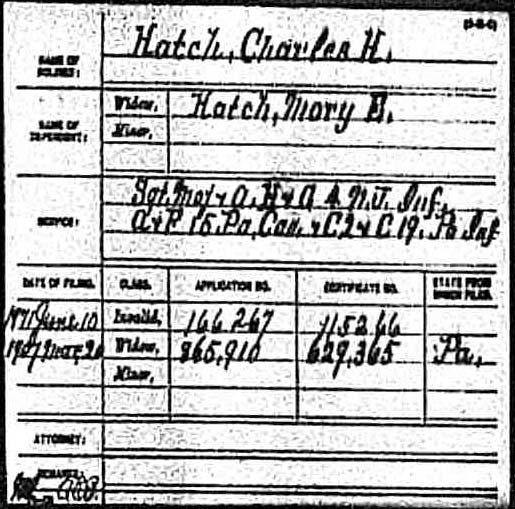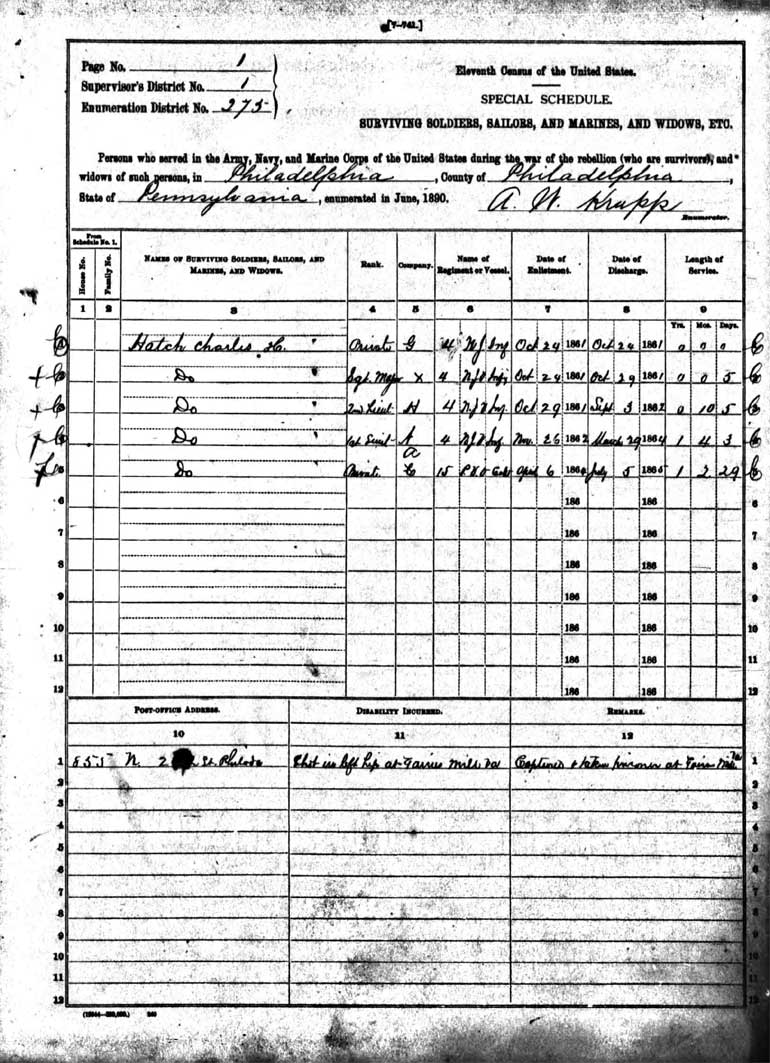
|
CHARLES
HOLLINGSHEAD HATCH was born
in 1835,
the son of George G. Hatch who died in Portsmouth, Virginia in 1842
leaving Charles and his two siblings without a father. Charles's
mother was Elizabeth Champion from Waterford Township. Gloucester
County, and it was to the Champion family that the widow Hatch and
her
children turned.
The
Champions' were farmers and young Charles became a farmer and
continued to work on his Uncle Benjamin Champion's farm. In his
later
teens he went to live for a while in Philadelphia with other
family
members, and at the outbreak of the Civil War in early 1861
joined a
Company formed in Philadelphia but was
later disbanded.
Returning to his home in Camden, he followed his cousin
William
Browning Hatch, enlisting on October 24, 1861 as a
Private in
Company
G,
4th
Infantry Regiment New Jersey Volunteers
and quickly rose in
|
|
rank. Charles to
Second Lieutenant, and
William
ultimately to full Colonel, in command of the Regiment. Charles
Hatch
was promoted to Full Sergeant Major on October 18, 1861 and to
Second Lieutenant with Company H on November 4, 1861.
Their regiment became part of the Grand Army of the Republic
defending
first Washington DC and then taking part in the Peninsula
Campaign to
wrest Richmond, then the capital of the Confederacy, from the
Rebel
forces. Then fought their way up from the mouth of the James
River to
within several miles of Richmond but the tides of war turned and
they
were overwhelmed by Lee's forces. The Fourth New Jersey
fought on
June
27, 1862 at Gaines Farm, VA, a battle also referred to
as
Gaines'
Mill. During the battle of Gaines' Mill, Lieutenant
Hatch was
wounded and escaped taking shelter in
a nearby farm house. This farm house was at one time used by
General
Porter.
Some three days after the fight at Gaines' Mill, Confederate
soldiers
captured a wounded, shot in the hip, Charles Hatch. His cousin,
Lieutenant Colonel
William
B.
Hatch had
also been captured, as was a Private from Company I,
Woodrow
Hughes. They were transported to Richmond for
imprisonment
in the infamous Libby prison. Other prisoners from Company H
included
Thomas
Grapevine and
Joshua
Fish Stone..
After
a relatively brief period of captivity, the two cousins and most
of the other prisoners from the
4th
Infantry Regiment New Jersey Volunteers were exchanged
for
Confederate prisoners and returned
to their regiment. Charles Hatch's wound, however, rendered him
unable
to serve and he was
eventually honorably discharged to a doctor's care in Camden. He
resigned his commission on September 3, 1862. His unit carried
him on the roster through the end of the war, however.
William
B. Hatch was promoted to full Colonel and took command of
the
Fourth New Jersey in late August, 1862. He led the regiment at
Fredericksburg in
December 1862 and during the battle of Marye's Heights was
fatally
wounded. Colonel Hatch was
returned
and interred in Evergreen Cemetery where a
monument to his service to the Union was erected.
Charles Hatch returned to civilian life.
Still suffering from
the effects of his wound, he never returned to full health, and
began
collecting his Civil War disability pension in 1871. For a short
time he
served as a Magistrate in Mays
Landing until a stroke left him further disabled. His first wife
Margaret "Mary" Woolf of Philadelphia died shortly after
giving birth to a
son Thomas. In 1890 he was living at 855 North 2nd Street in
Philadelphia PA. Eventually he remarried Elizabeth Cruickshank
and
remained
in Philadelphia living on a small disability pension and
spending some
time in the New Jersey Home for Disabled Soldiers Home in
Kearny, New
Jersey, where he was living at the time of the 1900
census.
In 1907,
after having been returned to his home in Philadelphia, his
health
rapidly sinking, he died.
Charles
Hatch along with his second wife was buried in Evergreen
Cemetery, near many other members of the Hatch extended
family.
Another
cousin, Joseph Champion, also served in the Union army during
the Civil War.
|



